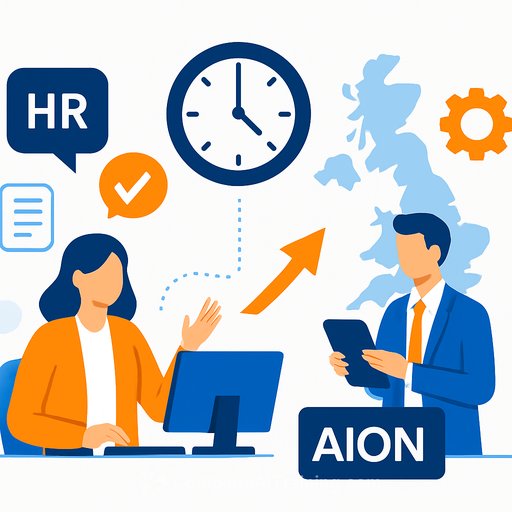AI agents to ease NHS strain and free up £340 million: what HR needs to know
The NHS is stretched. Long waits, staff burnout, and rising admin loads are hitting clinical quality and morale. Agentic AI systems offer a way to reduce pressure without adding headcount or blowing up budgets.
These aren't chatbots that get lost after one question. They are digital assistants that read natural language, take action across systems, and complete multi-step workflows end to end.
What agentic AI actually does
Agentic AI can read a request, pull data from multiple platforms, make a decision within set rules, and finish the task. That includes electronic patient records, HR systems, finance tools, and booking platforms.
"Proactive AI systems that understand natural language, work across multiple platforms, and can carry out multi-step workflows from start to finish are essential to mitigate bottlenecks, boost efficiency, cut patient queues, and save time & money," said Joseph Kim, Chief Executive Officer, Druid AI.
The goal isn't replacement. It's support. Staff get answers and complete actions faster, so more time goes to care, not admin.
Where HR can deploy first
- Patient booking and follow-ups: triage simple queries, reschedule appointments, send reminders, log outcomes.
- Referral administration: check completeness, prioritise based on rules, route to the right service, update status.
- Rota and shift management: fill gaps, match skills, offer shifts to bank staff, confirm via SMS/email.
- Pre-employment checks: automate ID, right-to-work, DBS prompts, references, and onboarding workflows.
- HR service desk: handle leave queries, policy FAQs, payroll tickets, and contract changes 24/7.
- Finance support: expense queries, invoice matching, and purchase order status checks.
- L&D nudges: mandatory training reminders, scheduling, and completion tracking.
Measured impact, not hype
The Tony Blair Institute for Global Change estimates AI in patient navigation could free up 29 million GP appointments annually, valued at around £340 million each year. That time and budget can be redirected to priority services, staff development, or reducing agency spend.
For HR, the gains look practical: fewer repetitive tickets, faster pre-employment cycles, better roster fill rates, and clearer workload visibility.
See analysis from the Tony Blair Institute.
Data security and integration
Security concerns are valid. Modern platforms support encryption, biometric sign-in, and independent detection/monitoring of sensitive data. Role-based access limits who sees what, and full audit logs track every action.
These systems integrate with existing infrastructure like EMIS or Epic, plus legacy HR and procurement tools, without exposing more data than necessary. Automated patching and updates reduce security debt as requirements change.
NHS Data Security and Protection Toolkit.
Guardrails and ethics HR should insist on
- Human-in-the-loop for clinical, safeguarding, or hiring decisions with material impact.
- Clear accountability: named SRO, data owner, and change approver.
- Role-based access, least privilege, and immutable audit trails.
- DPIAs completed before go-live; align to DS&P Toolkit requirements.
- Clinical safety cases for patient-facing workflows (e.g., DCB0129/0160 where applicable).
- Bias testing, red-teaming, and performance monitoring in production.
- Transparent staff engagement and union consultation ahead of rollout.
As Kim put it, the ethical use of AI is to inform and support human decisions, not make them. Build your operating model around that principle.
Staff experience: less admin, more care
When routine tasks run themselves, people feel the lift. Fewer repetitive calls. Faster answers. Clearer processes.
HR can reduce burn-out drivers-queue backlogs, manual rework, system hopping-while improving retention and internal mobility with time freed for development.
90-day implementation plan
- Days 0-30: Pick 3 high-volume use cases. Map current workflows. Define guardrails and escalation paths. Select an agent platform. Set baseline KPIs.
- Days 31-60: Build and integrate with EPR/HR/finance systems. Complete DPIA and security reviews. Train a pilot cohort. Dry-run test with real tickets.
- Days 61-90: Go live in 1-2 sites or teams. Monitor daily. Fix edge cases. Publish results. Plan scale-up with shared services.
KPIs HR should track
- Time-to-hire and pre-employment check cycle time.
- Roster fill rate and time to fill shift gaps.
- First-contact resolution and average handling time for HR service tickets.
- Referral admin turnaround and appointment no-show rate.
- Bank/agency spend as a percentage of pay bill.
- Staff satisfaction (pulse surveys) and overtime hours.
- Data access incidents and policy exceptions (should trend down).
Patient experience (and why it matters to HR)
Faster booking, clearer guidance, and timely follow-ups reduce frustration on both sides. Agentic AI can guide prescription management, self-care prompts, and scheduling-while cross-checking decisions against best practices behind the scenes.
Generative models can make errors; governance and agent validation steps keep outcomes safe and consistent. Better patient flows mean fewer complaints and a calmer workload for staff.
Budget and operating impact
£340 million in annual value is a national view, but the local impact is tangible: less overtime, fewer agency shifts, and smaller admin backlogs. That opens room for redeployment into hard-to-staff services and training.
Start small, prove value, reinvest savings, and scale. The pattern compounds quickly when HR leads with standards and outcomes.
Upskill your HR team
If your team needs a quick path to practical AI skills for HR operations, explore AI courses by job role. For process-focused content, see our automation resources.
Bottom line: agentic AI is a force multiplier for the NHS when deployed with guardrails. Reduce operational strain, protect data, and give people time back to do the work that matters.
Your membership also unlocks:






